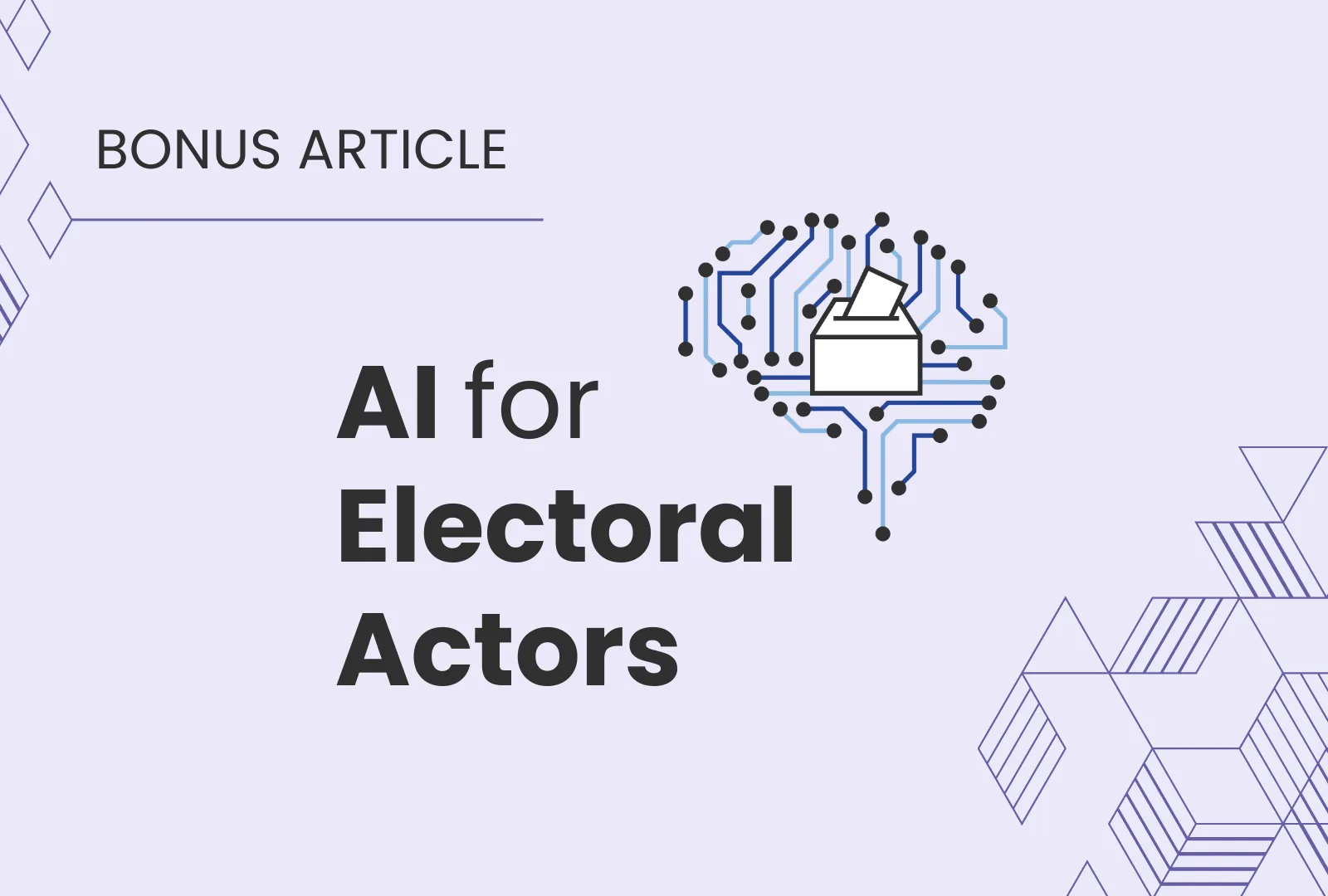Meeting the EU AI Act’s AI Literacy Goals: Lessons from IDEA

This is a bonus installment to the article series published as part of International IDEA’s AI for Electoral Actors project. The full series so far can be found on the project site here.
At the beginning of this year, the first provisions of the EU’s Artificial Intelligence (AI) Act came into force. Although it is an EU law, its reach is global: any organization that offers AI systems to users in the EU—regardless of where it is based, how large it is, or how much revenue it generates—must meet the Act’s requirements. These provisions not only enforce a ban on risky AI practices but also impose a forward-thinking mandate: Article 4 mandates providers and deployers of AI systems to actively foster AI within their organizations.
In accordance with Article 4, every provider or deployer of AI must ensure that staff and stakeholders attain sufficient AI literacy, thereby making the Act applicable across diverse settings. This often-overlooked requirement could be a key measure to ensure that the transformative power of AI is harnessed responsibly, yet it raises questions of how to effectively put this into practice. After having conducted AI literacy programs across various regions last year under International IDEA’s AI for Electoral Actors project, this article explores key lessons learned about effective AI literacy raising which includes common pitfalls to avoid, and why empowering organizations with AI literacy may be crucial for navigating the digital future.
A good starting point when addressing AI literacy - like any area of regulatory action—is to ask: what does the law require, and how is AI literacy defined? The AI Act mandates that all providers and deployers of AI must achieve a sufficient level of AI literacy –defined in Article 3 (56) of the EU AI Act. The definition entails both the skills and knowledge needed to safely develop and deploy AI systems and a full understanding of their potential benefits and risks. To comply, organizations that use AI are required to implement targeted literacy trainings and awareness programs that cover not only the technical aspects of AI but also the specific contexts in which these systems are used and the characteristics of their intended users. This requirement is particularly critical in electoral processes, where an inadequate grasp of AI’s capabilities and risks could lead to harmful outcomes such as manipulative campaign practices, disinformation, or compromised voter autonomy and infringement of civil and political rights. By demanding a robust level of AI understanding, the Act helps safeguard democratic integrity, foster transparency, and maintain public trust - which illustrates precisely why the development of AI literacy is essential in contexts beyond commercial or technical domains.
Given our recent experience supporting electoral management bodies (EMBs) in enhancing AI literacy, we've identified three critical lessons for safeguarding electoral integrity and increasing resilience:
First, AI literacy programs must extend beyond purely technical considerations to include human rights, ethical dimensions, and broader social, political, and contextual implications. Survey data from International IDEA’s workshops reveal that most electoral officials still have only a rudimentary grasp of AI - fueling concerns about rights violations, hidden errors, and cyber-vulnerabilities. Those concerns are justified. In elections, AI can amplify bias, distort public discourse, and erode voters’ trust in democratic institutions. It is therefore crucial to avoid approaches that treat these issues as secondary concerns or reduce them to mere compliance checklists. Organizations should refrain from relying solely on technical aspects and fixes without considering the broader implications or deferring responsibility entirely to algorithmic design. Consequently, AI literacy programs should include discussions on key ethical principles— such as fairness and non-discrimination, accessibility, accountability, transparency and explainability as well as privacy and security, while also emphasizing that robust human oversight is the final safeguard in any AI process. Equipping officials with this holistic skill set allows them to spot downstream harms, not just operate the software. The new literacy duty in Article 4 of the EU AI Act arrives at precisely the right moment, turning that broader competence from a best practice into a legal obligation for electoral management bodies and other AI providers.
Second, proactively adopting risk mitigation strategies is essential to effectively address concerns about potential AI risks. In this high-stakes environment, even a single overlooked bias, data leak, or adversarial exploit can infringe on crucial civil and political rights, erode public confidence or invalidate results. For EMBs, that are deployers rather than developers of AI tools, the key leverage point lies in how those tools are acquired and introduced.: By building clear standards and meaningful oversight into contracts and deployment plans, officials ensure safeguards are in place from the very start. Equally important is deciding whether AI is the right fit in the first place; some electoral functions—such as low-volume data entry or highly sensitive voter-registration decisions—may be better served by simpler rule-based software or direct human oversight. Embedding these strategic “use-case” filters alongside contractual safeguards demonstrates due diligence to parties, observers, and voters. Put simply, front-loaded, context-aware risk mitigation is the only way to keep sophisticated AI tools from becoming liabilities once they confront the unforgiving realities of an election cycle.
Finally, while the implementation of AI literacy programs remains a work in progress, these programs stand out as among the most effective ways to reduce potential risks and ensure responsible AI deployment in electoral processes. Well-structured training equips staff to demand credible evidence of rights- and ethics-compliance from vendors, to scrutinize proposals against institutional values and to set clear expectations of transparency and accountability. That same knowledge base also enables officials to design proportionate measures that protect the information environment and shield political campaigns from manipulation or other forms of illegitimate interference. Because the learning is continually reapplied to new technologies, emerging threats and evolving legal standards, literacy programmes become a self-reinforcing line of defense, making them one of the most effective instruments for sustaining electoral integrity without stifling legitimate innovation.
Summing up, a holistic approach to AI literacy is essential to fully comprehend these wider societal, legal and ethical implications, especially in the specific contexts where AI is applied and the individuals it affects. In our recent discussions with electoral management bodies (EMBs) and CSOs, participants emphasized that closer collaboration between the two can significantly advance AI literacy. They highlighted the current lack of civil society oversight in AI for elections and stressed the importance of continuous cooperation and shared expertise to address emerging risks. These lessons extend beyond the electoral sphere; wherever AI tools are developed or deployed, engaging a diverse range of stakeholders is crucial for ensuring a comprehensive understanding of the technology’s broader impact and the context in which it is deployed.
Getting AI literacy right will not be easy, but it is potentially one of the best ways to curb AI’s potential harms while unlocking its benefits. Now that Article 4 of the EU AI Act has entered into force—and with it a legal duty for providers and deployers to demonstrate “sufficient” AI literacy—the stakes could not be clearer. Results from initiatives such as International IDEA’s AI for Electoral Actors training programme offer encouraging signs as participants have left the trainings with greater sensitivity and awareness of its human rights, ethical, and broader social, political, and contextual implications—all of which are essential for developing effective mitigation strategies for potential harms and risks. By equipping any and all providers and deployers of AI with the necessary skills and insights to navigate both the technical and ethical dimensions of AI, these training programs play a pivotal role in responsibly developing and using AI tools. Moving forward, continued investment in AI literacy will be critical not only for electoral management but also for strengthening AI governance across all sectors, ensuring that AI technologies are used responsibly and ethically.




